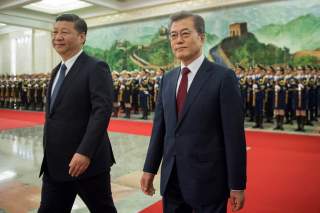Is South Korea Pro-China and Anti-Japan? It’s Complicated.
Seoul's complicated history prevents it from being inherently anti-Tokyo or pro-Beijing.
Geopolitical necessities also hint at improvement in Japan-South Korea relations and deterioration in China-South Korea relations. The 2018 report by Genron NPO and the East Asia Institute shows that approximately 36 percent of Japanese and even greater 61 percent of South Koreans would like to see greater security cooperation between Seoul and Tokyo. North Korea is a major factor contributing to this statistics. But the China factor also plays a role in that 40 percent of those supporting greater Japan-South Korea security cooperation stated to various degrees the need to “limit the rise of China” as a rationale for increased cooperation. If China becomes more assertive and powerful, Japan and South Korea, as quasi-allies, are likely to draw closer to each other, particularly if Seoul and Tokyo come to perceive that U.S. commitment to Asian security is eroding.
Moreover, while Seoul has been relatively quiet on the issue of the South China Sea and has refused to be part of the “free and open Indo-Pacific” policy backed by Tokyo and Washington, South Korea’s trade-dependent economy has much to lose if China becomes a major disruptive force in the Indo-Pacific region. South Korea’s net exports make up more than 40 percent of its GDP, based on the World Bank’s 2016 data. Furthermore, according to the U.S. Energy Information Administration, South Korea imports 98 percent of its fossil fuel needs. Of those, more than 80 percent of oil imports and more than half of the liquefied natural gas imports come from the far away Persian Gulf region. The South’s navy, while the eighth largest in the world, remains much weaker than those of China and Japan and lacks the capability to meaningfully project power far beyond Northeast Asia. South Korea has much to gain, not only by sticking to a robust alliance with the United States, but also by forging greater cooperation with Japan, whose JSDF is capable of matching China’s growing naval power.
Policymakers in the United States, China, Japan and elsewhere need to understand that South Korea is not inherently anti-Japan or pro-China. The history of Korea’s relations with China and Japan going back to ancient times shows that Koreans have always had a complicated, yet pragmatic relationship with their neighbors, and recent South Korean public opinion polls on China and Japan, too, have been fluctuating depending on circumstances. Current social and geopolitical trends also seem to forecast improvement in Japan-South Korea relations and deterioration in China-South Korea relations. Miscalculating South Korea’s geopolitical orientation could lead to lesser support on the part of Americans for the U.S.-South Korea alliance, less solidarity on the part of Japanese with their South Korean quasi-allies, and further emboldening on the part of Chinese in the attempt to pry South Korea away from the United States. As the Korean Peninsula has historically been the center of geopolitical competition in Northeast Asia, a nuanced understanding of Seoul’s position and perception toward Beijing and Tokyo would help all relevant parties contribute to long-term strategic stability in the region.
Sungtae Park is a research associate for the Korea Studies program at the Council on Foreign Relations.
Image: South Korean President Moon Jae-In and Chinese President Xi Jinping review the Chinese honour guard during a welcome ceremony at the Great Hall of the People in Beijing, China December 14, 2017. REUTERS/Nicolas Asfouri/Pool

